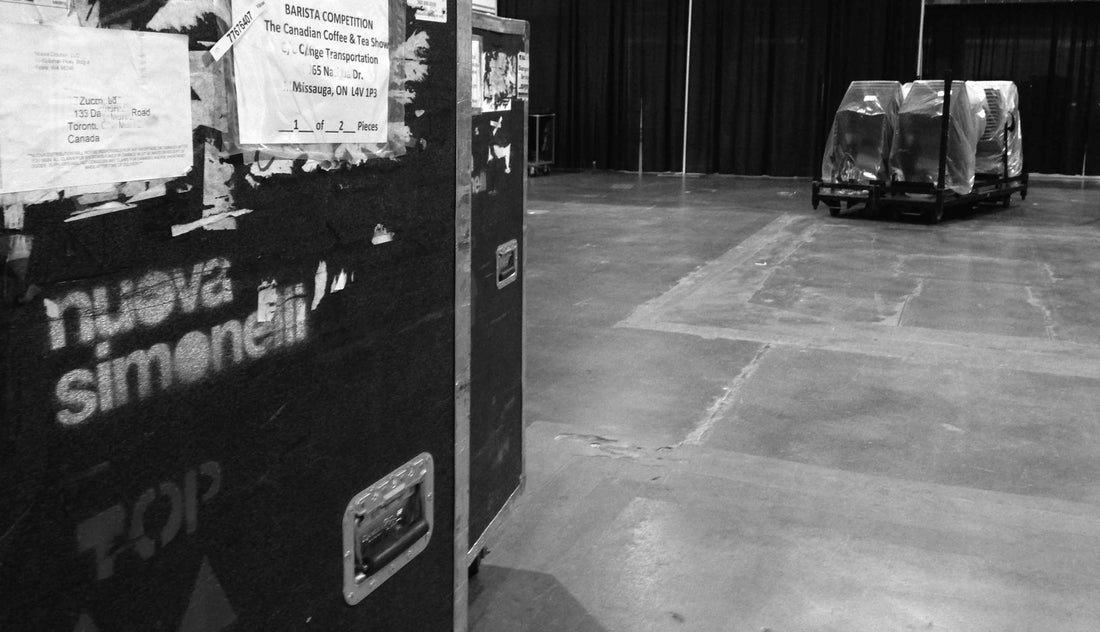How Barista Competitions were organized
To help facilitate discussion at the SCAA meeting of Canadian Coffee minds, I thought I would provide a summary of how the Barista events are organized in Canada, and subsequently funded to those of you who may not be familiar with the structure.
Feel free to pass on this email to anyone who may be interested in this.
Background
The Canadian Barista championships and allied regionals are under the wing of the Coffee Association of Canada (CAC). The CAC in turn delegates the running of the championships to the sanctioned body Canadian Barista Academy (CBA). In turn CBA has delegated much of this responsibility to Les Kuan, as technical director of the CBA.
Canadian Barista Academy
The CBA was created in 2001 by Les Kuan and Vida Radovanovic, to aid in the administration of the barista championships and to raise funds through educational seminars. In the early days, the CBA took total financial responsibility for the event, so any shortfalls in sponsorship came out of the wallets of the CBA.
The educational seminars put on by the CBA were created out of necessity, as regional committees were often short of funds. It is the equivalent of "doing dishes" to pay for your restaurant tab. This has allowed the CBA to involve past champions and talented baristas to give back to the cause by teaching as a guest instructor at CBA seminars. All baristas are paid for their teaching, to compensate them for their generosity in time and to establish a market value for their expertise.
The CBA has since evolved into the regulatory body of the Canadian national and regional barista championships, overseeing the running of the "contests" and the certification of judges in Canada.
The CBA is also actively involved in securing sponsorship for regional events, on a national basis. This provides much needed funding for local committees.
Judging
Head judges are appointed for each region and national, by the CBA.
Head Judging and judging is strictly volunteer based. Often sponsors have innocently offered to pay to bring up certain judges from out of town, but this has been always graciously refused. It is the CBA's long held opinion that judges are not to be paid for judging as this would be inappropriate, seeing as the money to pay judges would come from sponsors who could potentially have competitors in the competition.
The role of the head judge is as much administrative as it is about tasting coffee. It's is the head judge's role to make sure they have an adequately prepared judging pool, to ensure a fair contest. Being a head judge is a big responsibility and involves dozens of emails, scheduling, etc.
The head judge decides who is fit to judge, who is objective, and who is unbiased. Ultimately the head judge is responsible for the results and is given full authority to lead judges training.
The performance of the head judge is reviewable by the CBA.
When required by the World Barista Championship, WBC regulatory bodies are brought in on the host sponsors budget to oversee our events. The CBA has been involved in WBC certification where required.
Regionals
Currently there are 4 regional events, and one national championship. All events rely heavily on volunteer labour.
Basic funding for all the events is from machine sponsors and host sponsors. The host sponsor is responsible for creating a committee that will be financially responsible for the regional event. Often the machine sponsors and the host sponsors are one in the same.
For example, last year Nuova Simonelli was the machine sponsor in each region, and was represented by their distributors in each region. ECM/Machine and beans in Victoria, Espuccino/Fratello in Calgary, Zuccarini Importing in Toronto and Espresso Mali in Montreal. All shipping costs for machines are born by Nuova Simonelli and its dealers.
The Host sponsors for the Pacific Region were Reg Barber, Fratello in Prairies, Zuccarini in Central, and Cafe Mystique/Espresso Mali in Eastern.
Because the Host sponsors bear all the financial risk and responsibility, they determine who is on committee, solicit sponsorship, gather volunteers, provide a facility with adequate power, water, wifi, and head the marketing of the event. Basically, those who put up the money, call the shots.
The committee is also responsible for recruiting competitors and potential judges for the event.
Any shortfalls in funding are the responsibility of the host sponsor (who may delegate it to the committee), and any surpluses are either saved for the following year or paid out in prize/travel money to the regional champion.
Canadian National Barista Championships
The National Canadian Barista Championships is run the same way as the regionals.
Nuova Simonelli is the Machine sponsor and Fulcrum Enterprises, who run the Canadian Coffee and Tea Show, is the Host sponsor.
Fulcrum is basically responsible for any cost overruns, sells sponsorship, provides administration, marketing, promotion for the "event", much like regional hosts. They are simply a host, and the Coffee Tea Show is the venue they provide, free of charge, along with power, water, wifi, and signage.
The CBA runs the national "contest", appoints the head judge, approves the qualifying regional competitors, just like the regionals.
Fulcrum is not involved in the judging.
Sponsors for the Nationals are separate from the sponsors for the Coffee and Tea Show. In 2009, CNBC sponsors were Krups, Nuova Simonelli, Jet, Pacific Soy, Ghiardelli, Monin, Gerhards, Oregon Chai, Coag, Urnex, Hamilton Beach, Cirqua and Reg Barber Enterprises.
Fulcrum pays for the video, wifi, streaming, teleconferencing, shipping for the nationals and also stores the competition tables for the events. Fulcrum also provides the prize money needed to send our national champion to the World Barista Championships.
Current State of events
There seems to be a fallacy that there is a lot of extra money floating around the regional and national contests. Those of you who have helped at the committee level and have overseen the regional budgets, are more than aware of the financial difficulties involved in throwing regional and National events.
All sponsorship dollars raised are used for the event, and often the budget is heavily subsidized by the hosts. Where possible, the CBA subsidizes the events by organizing seminars that coincide with the regional and national events.
Often is the case that we do the best we can do to put our best face forward to the public and show them what specialty coffee is all about, while facing the challenge of travelling costs across our large country.
Despite our limited budgets, we have managed to improve the events each year, and feel we have set the standard as far as live streaming, regional structure, and growing support of the event at the grassroots level.
Our growing partnership with regional and national hosts and sponsors has made all this possible.
Our Canadian model of making all competitors go through regionals to qualify for nationals has allowed us to build solid foundations in every region. The key has been local sponsorship, by roasters, cafes, equipment suppliers, as they are also the main source of volunteer labour, and administrative support.
By involving local businesses, we ensure there are stakeholders from the community, which leads to a more organic competition.
Our live streaming telecast of the nationals last November drew 35,000 unique viewers. This is only the tip of the iceberg.
The Future
Our main objective for the 2010 competition year is to continue with our goal of making the regional events more consumer friendly, so that the regionals become a way to reach consumers with our message of specialty coffee. We encourage everyone to work together and create a common united front to present to the consuming public.
We want to involve the cafes in the promotion of regional events as they are the first point of contact with coffee consumers. Every cafe has between 100-900 customers walking through their doors every day. If each cafe can display point of sale material, flyers, tickets or coupons that direct coffee consumers to our regional events, then we can almost guarantee a well attended event.
This years regionals will be a testament to our grass-root promotional efforts, but it will require local sponsorship to grow.
Sponsorship is always a point of extreme focus. Our hope is that by growing our live streaming audience, and creating more public-oriented events, that we can attract a broader range of lifestyle sponsors, outside of the the coffee industry. The demographics of our highly educated, tech savvy, youthful third wave coffee consumer should be a magnet to advertisers.
On a personal note... this has been a 7 year journey for me, starting with Sherri Johns talking me into being a judge. I thought it would be a one time thing... little did I know.
What attracted me to the "third wave" was the unlimited potential, the fanatical energy, and the extreme dedication shown by the baristas.
What keeps me involved is that I see everyone wasting a huge opportunity to change the face of coffee, simply because everyone is not seeing the big picture.
I am not a stakeholder in your industry, yet here I am fighting for your industry.
I've said over and over again. The media has no reason to talk to us except when there is a report that coffee causes a new kind of cancer, or isn't good for your heart. The barista championships give us television, radio and other media exposure that none of us can afford to buy, not even the biggest third wave cafe chains.
We should feel obligated to help out with regional events, obligated to send volunteers, obligated to send judges, to sponsor tables, to promote the contests at our cafes.
I have been frustrated by the lack of cooperation in some regions, frustrated to be begging for volunteers, only to be later criticized for being disorganized. Mostly I've been frustrated by the failure for the movement to come together as a true community and take ownership of this event.
We need to realize that our common enemies are bad coffee, sport energy drinks, pepsi, coke, etc. We need to admit we are losing the battle in attracting younger, new consumers to coffee.
To do this, the leaders in specialty coffee need to come together and work as one, to push our beverage into the forefront.
I am encouraged that some of you have taken up the cause, through your tireless work in the regional committees, as cameramen, runners, bussers, judges, and head judges. Those of you who have chosen to stand by while everyone else sweats, you know you can do much better.
The youth in our industry take their leads from their leaders, so let's set the right example and grow specialty coffee in Canada.
This year, when we come knocking at your door for help. Please think twice about what you are saying no to.
------------------------
I hope this makes things clearer. If you have any comments or questions, please don't hesitate to contact me
Les Kuan


